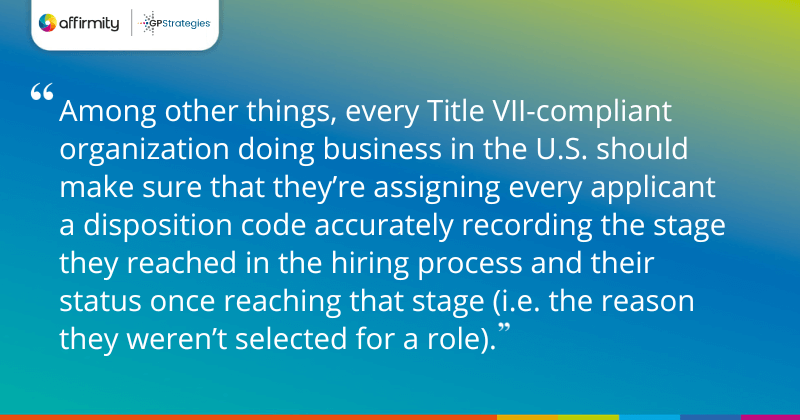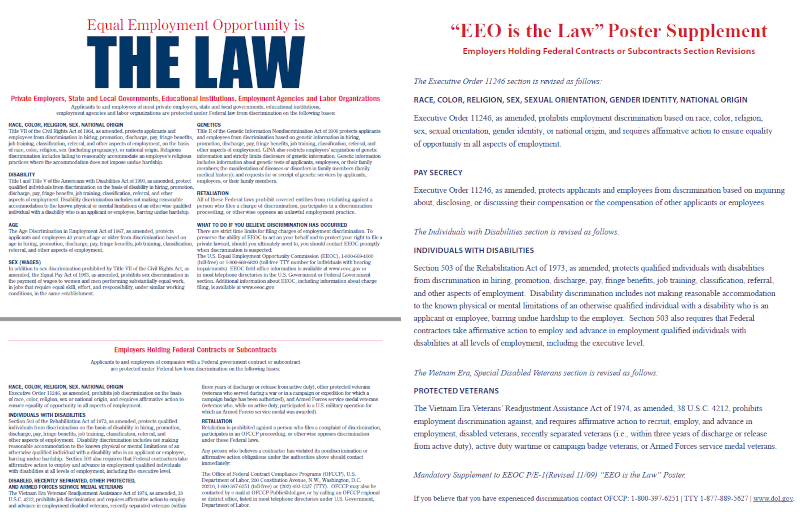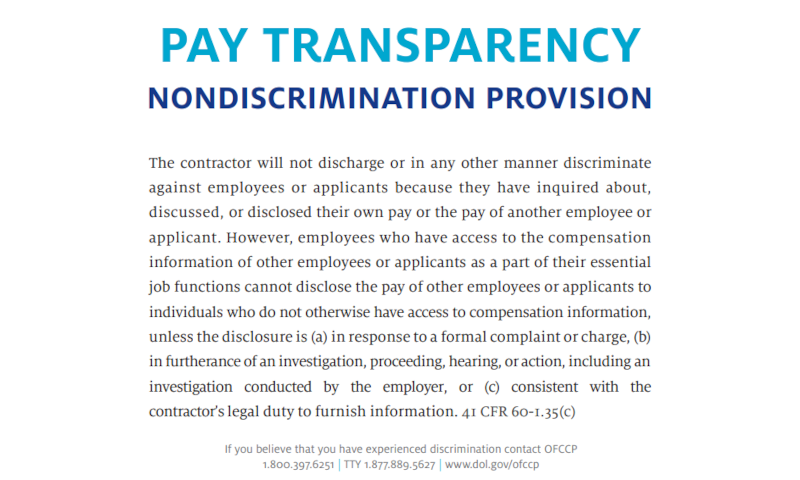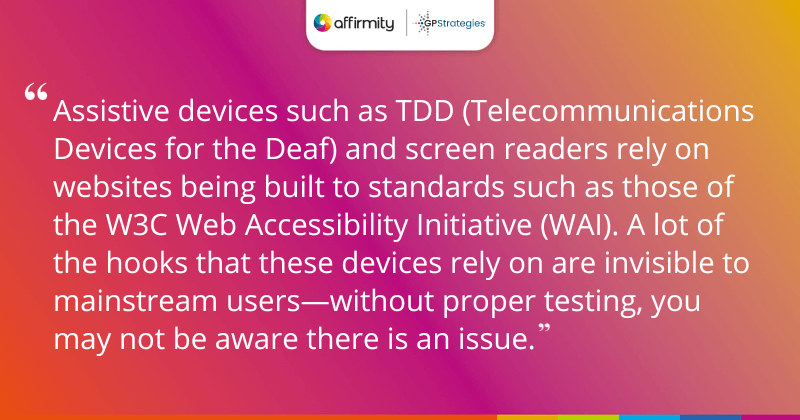It’s always a good time to refresh your understanding of U.S. employment law, hiring data collection standards, and your accessibility obligations. In this extract from our latest guide, ‘Getting Started With Compliance and DE&I’, learn to steer clear of some common mistakes our experts have seen while helping talent acquisition professionals in organizations just like your own.
Understand the Law
Obviously, the bare minimum of any non-discriminatory hiring program needs to be in compliance with all the local and national laws that apply wherever your organization operates. It goes without saying that this is an intricate area, but one worth summarizing here:
Employment Law in the United States
The U.S. Equal Employment Opportunity Commission (EEOC) is responsible for enforcing federal-level discrimination laws including:
- Title VII of the Civil Rights Act of 1964: Title VII prohibits discrimination on the basis of race, color, religion, sex, or national origin (or because of association with an individual on the basis of those characteristics). Later supreme court rulings interpreted ‘sex’ to cover discrimination on the basis of sexual orientation and gender identity.
- The Age Discrimination in Employment Act of 1967 (ADEA): Similar to Title VII but focused on age-related protections.
- Title I of the Americans with Disabilities Act of 1990 (ADA): As above, but focused on protections for persons with disabilities.
- The Genetic Information Nondiscrimination Act of 2008 (GINA): Prohibits the use of genetic information (e.g. predisposition to certain medical conditions discovered via medical tests) in employment and health insurance decisions.

Additionally, organizations that do business with the federal government must comply with and operate under the assumption of audit by the Office of Federal Contract Compliance Programs (OFCCP). The OFCCP enforces the following laws related to hiring practice:
- Executive Order 11246: Covers discriminating on the basis of race, color, religion, sex, sexual orientation, gender identity, or national origin and requires organizations to take Affirmative Action. Applies regardless of number of employees as soon as your organization’s federal contracts exceed $10k USD.
- Section 503 of the Rehabilitation Act of 1973: Concerns individuals with disabilities specifically. Applies if contracts exceed $15k USD.
- The Vietnam Era Veterans’ Readjustment Assistance Act (VEVRAA): As above, but concerning veterans. Applies if contracts exceed $150k USD.
All organizations will also want to consider:
- The 1978 Uniform Guidelines on Employee Selection Procedures: Though not a law, the guidelines are often treated with similar weight in court and describe how selection procedures should be used and validated for use
- State and Local Laws: While states mostly replicate federal hiring laws, some have notable additional laws. (For example, Illinois’ Artificial Intelligence Video Interview Act).
RECOMMENDED READING | ‘11 DE&I Practices Strongly Linked to Successful Programs’
The Basics of Talent Acquisition Compliance in the U.S.
In order to comply with Title VII and its associated federal laws, every organization doing business in the U.S. should make sure that they’re:
- Assigning every applicant a disposition code accurately recording the stage they reached in your hiring process and their status once reaching that stage (i.e. the reason they weren’t selected for a role)
- Collecting and storing race and gender information using appropriate online forms and tear-off sheets
- Testing hiring processes to uncover adverse impact
- Ensuring that job descriptions and basic qualifications are up to date
- For example, you may have acquired new machinery that has made certain physical requirements (e.g. ability to lift certain weights) irrelevant and your qualifications unnecessarily discriminatory.
- Consider also how language usage may be exclusionary.
Additional Considerations for Federal Contractors
A key responsibility as a federal contractor is ensuring that candidates are aware of their Equal Employment Opportunity rights, or at least pointed in the direction of the policies you must abide by as their employer. In reality, non-compliant job postings are common both online and off—Affirmity’s experts estimate that in 95% of investigations on behalf of clients, they’ve discovered at least one instance of this information not being properly provided.
- EEO Taglines: Every solicitation or advertisement for employees must either state that “all qualified applicants will receive consideration for employment without regard to race, color, religion, sex, sexual orientation, gender identity, or national origin”, or feature an abbreviated form of this statement such as “We are an Equal Opportunity/Affirmative Action Employer” (or “EOE/disabled/veteran employer”).

- EEO Law Poster and Supplement: Both the original “Equal Employment Opportunity is the Law” poster and the poster supplement detailing EO 11246 revisions (see both above) should be available to all applicants. You should therefore hyperlink both documents on your job listings.

- Pay transparency notice: In addition to the above, you must post the Pay Transparency Nondiscrimination Provision poster setting out the non-retaliatory practices around salary non-disclosure.
The other main area of responsibility is record-keeping:
- Your organization needs to maintain copies of requisitions, applications, dispositions, and reasons for not selecting people for at least two years. Logs regarding disability and veteran status must be maintained for three years.
- Make sure you link all applicants to where they’re sourced from, so that you can prove the effectiveness of any measures you have taken to increase the likelihood of getting diverse candidates.
- While collecting protected demographic info, you must take care to keep it separate from applications so that the information is not available to decision-makers. With paper forms that means making the self-identification element a tear-off.
MORE ON RECORD-KEEPING | ‘OFCCP Audits: Why You Should Retain and Analyze Job Seeker Data for Audit Purposes’

Why You Must Make Accessibility a Priority
The almost wholesale shift to online applications in the last two decades has made the process of applying for work convenient for many, but not for all. Even assuming that the vast majority of your applicants can access an internet-enabled device at home, on your premises, or in another venue such as a public library, accessibility remains an issue. You may be overlooking any of the following factors:
- Is your website accessible? Assistive devices such as TDD (Telecommunications Devices for the Deaf) and screen readers rely on websites being built to standards such as those of the W3C Web Accessibility Initiative (WAI). A lot of the hooks that these devices rely on are invisible to mainstream users—without proper testing, you may not be aware there is an issue.
- Are in-person applications accessible? For example, if you have kiosks for accepting applications, can every suitable candidate use them?
- Will your interviews be accessible? You should prominently display verbiage on your website regarding how to request an accommodation, such as:
If you have a disability and would like to request an accommodation in order to apply for a position with ABC COMPANY, please call xxx-xxx-xxxx or email our HR staff at xxxx.xxxx@xcompany.com.
While being prepared to accommodate applicants is important, you should always remain within the law. An employer may not ask disability-related questions until after it makes a conditional job offer to the applicant. More information is available from the EEOC.
MORE FROM THE BLOG | ‘5 Inclusive Mindsets That Create Better Businesses for Employees With Disabilities’
Getting Started With Compliance and DE&I—Keep Reading!
Talent acquisition professionals have a critical role to play in realizing an organization’s diversity, equity, and inclusion (DE&I) goals. In our full guide, after considering the compliance obligations above we also look at:
- The data management principles that will help you manage risk
- The processes that will help you ensure that every great applicant is treated with minimal bias, regardless of their background
Download the full guide today.

